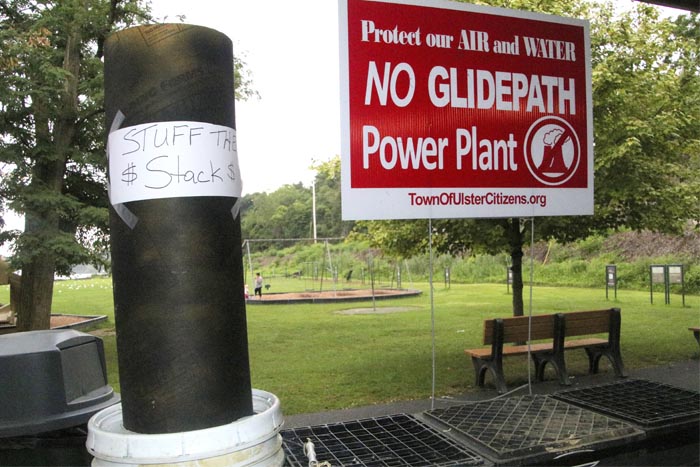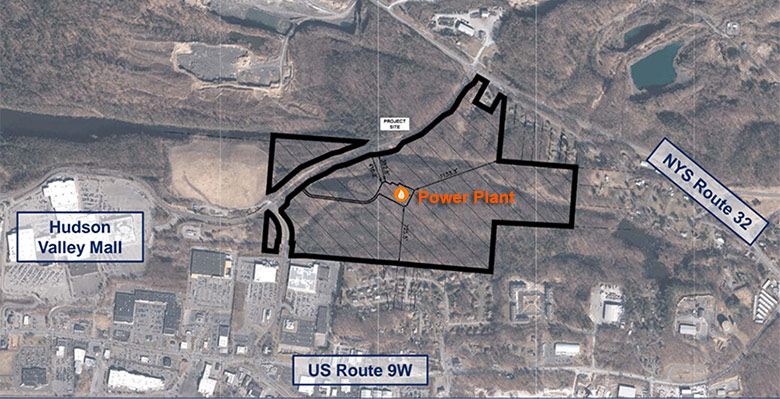
An image from a recent picnic held by TownofUlsterCitizens.org to organize resistance to the plant plan. (Photo by Phyllis McCabe)
Though foes of the proposed Lincoln Park Grid Support Center (LPGSC) “peaker plant” proposal couldn’t get discussion of a potential utility project moratorium officially added to the agenda of last week’s Ulster Town Board meeting, they did have a chance to talk about it during a sometimes-contentious public comment period.
Arguments went back and forth, with one side calling for a timeout while the town’s zoning code is looked at and possibly amended, and current and former town officials saying the process should be allowed to play out.
At the opening of the Aug. 16’s meeting’s public comment period, Laura Hartmann of TownOfUlsterCitizens.org delivered a petition signed by 177 people asking the town board to put a temporary moratorium on approving power plants while officials clarify how they’re regulated in town zoning code.
“I moved into this area 11 years ago,” said Hartmann. “The morning I woke up after moving here 11 years ago, I took a huge, deep breath and felt refreshed and like I was able to breathe for the first time in a long time. We stand to lose all of that with the building of this power plant if it happens. And that’s not just my quality of life; it’s everybody’s in this area.”
The town is serving as lead agency on the project’s state environmental quality review, with developers presently preparing a draft environmental impact statement (DEIS) to respond to questions by municipal leaders and members of the public. That document is expected to be completed by the end of the year. Many, though, are trying to convince town officials it’s not a good fit for the community.
The GlidePath-run power plant would operate on a small parcel of a 121-acre site off Frank Sottile Boulevard. The GlidePath-run power plant, which would run on natural gas (with diesel as a backup) and feed power into a 20-megawatt lithium ion battery array, would operate on a small parcel of a 121-acre site off Frank Sottile Boulevard. It’s intended to be a “peaker” plant, which would fire up at times of peak electricity use to feed electricity into the greater grid.
Regis Obijiski, also with TownOfUlsterCitizens.org, said a lack of clarity in how power plants and utility companies are regulated could leave the town open to incongruous development beyond the plant in question.
“The town’s zoning code, updated in 2014, defines neither utility company structure nor various kinds of electric-generating facilities such as win, solar, hydro, fossil fuel, etc. … that may or may not qualify as utility companies,” said Obijiski. “Let’s get this right on every single level. Please take our request for a moratorium on fossil fuel plants seriously, educate yourselves, and embrace citizen input throughout your deliberations.”
Scenic Hudson Land Use Director Jeffrey Anzevino said that the current zoning code as it pertains to utility company structures differs from what GlidePath is proposing.
“It is extremely unlikely that the town intends to permit power plants, with their heavily industrial character and significant health, environmental and quality-of-life impacts, within even the most restrictive residential district in the town,” Anzevino said. “We believe that ‘utility company structures’ are facilities like electric distribution lines, substations, and other similar local infrastructure, not commercial power plants.”
Town Attorney Jason Kovacs said the town disagreed with the assertion that the proposed power plant was misclassified, but even if they had it was also too late in the process to shift gears.
“We are deep into the environmental review process,” said Kovacs. “It’s really a null moment … We need to let the process play out. For us to all of a sudden change our position now would put this town in danger of being sued by the developer. We’re not taking any side … We’re going to let the process play out. Let’s see what the result is.”
Town Supervisor James Quigley III agreed.
“There is case law that supports an applicant’s lawsuit against the town if the town should change the rules in the middle of the game.”
But Obijiski disagreed. “This is not new news,” he said. “This is old news made better, and really sharpened. I really think you ought to consider that and give better advice to the town. The way you put it, and I’m not trying to demean you, it made it seem like a fait accompli. A done deal. ‘We’ve gone this far, and this is not a moment.’ That’s what you said. And that is not true. The process still continues, the DEIS has not been issued…GlidePath has said this on numerous occasions, that when new information emerges, we must consider it, particularly information by experts….This is new information, so don’t say we’ve got to continue because we’re afraid of being sued, because that’s the message you gave. So be careful, gentlemen [of the town board], as you receive legal advice.”
Fred Wadnola, former town supervisor and current chairman of the Ulster County Resource Recovery Agency, agreed with Town officials that the process should be allowed to play out.
“I don’t know that much about GlidePath but the process is in motion,” Wadnola said. “The final approval of this project, I understand, is not the Town of Ulster Town Board, but it’s DEC Region 3, which is the toughest regulatory agency in New York State. I know that from experience having dealt with them for a number of years. So I can’t imagine the DEC is not taking everything into consideration.”
Anzevino disagreed with Wadnola’s take on the DEC’s power.
“The DEC does not have the land use authority over the plan, it’s really the town board as lead agency,” Anzevino said. “While the DEC may have some authority over the air permits, the town board is really the ultimate say over this project.”
The next meeting of the Ulster Town Board is scheduled for Thursday, Sept. 6.


Mr. Obijiski’s comment “This is not new news” re the ambiguity of the phrase “utility company structure” makes the case even more clear that the town board is walking a legal tightrope. Any ambiguity in the code is to be considered in favor of the applicant. That’s well established case law backed opinion. Since the mention of Utility Company Structure is contained in the Redevelopment Overlay District, GlidePath is allowed to apply for the use they’re seeking.
Should a definition of Utility Company Structure be forthcoming? Absolutely. But, not as involves this application.
As far as a moratorium at this point– in order for “officials [to] clarify how [power plants] are regulated in town zoning code” –it isn’t a fix for those not wanting this project to be approved. Any moratorium must include an exemption aspect that allows applicants with applications already in process to make a case for continuing the review. Most moratoriums exclude any application already submitted prior to consideration of taking such action.
Mr. Quigley is one hundred percent correct in stating, “There is case law that supports an applicant’s lawsuit against the town if the town should change the rules in the middle of the game.” The town wouldn’t likely prevail in a lawsuit if they excluded GlidePath from continuing the process while a moratorium was put in place.
Better to let the SEQR process unfold and hopefully, the Town Board will have numerous reasons to turn the project down.